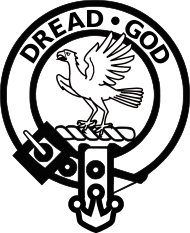Highland Scottish clan
| Clan Munro |
|---|
|
 Crest: An eagle perching Proper |
| Motto | Dread God[2] |
|---|
| War cry | Caisteal Folais 'na Theine |
|---|
|
| Region | Highland |
|---|
| District | Easter-Ross[2] |
|---|
| Plant badge | Common club moss[2] |
|---|
| Pipe music | Bealach na Broige[2] |
|---|
|
 |
| Hector Munro of Foulis[2] |
| The 35th Chief of Clan Munro (Tighearna Foghlais[1]) |
| Seat | Foulis Castle |
|---|
| Septs of Clan Munro
|
Dingwall, [3] Foulis, [3] Fowlis, [3] Keddie, [3] Kiddie, [3] MacAidie, [3] MacCulloch, [3] MacEeddie, [3] MacKeddie, [3] MacLullich, [3] Monro, [3] Monroe, [3] Munroe, [3] Vass, [3] Wass[3]
| |
|
|
|
|
|
|
|
|
Clan Munro (listenⓘ; Scottish Gaelic: Clann an Rothaich [ˈkʰl̪ˠãũn̪ˠ ə ˈrˠɔhɪç]) is a Highland Scottish clan. Historically the clan was based in Easter Ross in the Scottish Highlands. Traditional origins of the clan give its founder as Donald Munro who came from the north of Ireland and settled in Scotland in the eleventh century, though its true founder may have lived much later. It is also a strong tradition that the Munro chiefs supported Robert the Bruce during the Wars of Scottish Independence. The first proven clan chief on record however is Robert de Munro who died in 1369; his father is mentioned but not named in a number of charters. The clan chiefs originally held land principally at Findon on the Black Isle but exchanged it in 1350 for Estirfowlys. Robert's son Hugh who died in 1425 was the first of the family to be styled "of Foulis", despite which clan genealogies describe him as 9th baron.
During the fifteenth and sixteenth centuries the Munros feuded with their neighbors the Clan Mackenzie, and during the seventeenth century many Munros fought in the Thirty Years' War in support of Protestantism. During the Scottish Civil War of the seventeenth century different members of the clan supported the Royalists and Covenanters at different times. The Munro chiefs supported the Glorious Revolution of 1688 and during the Jacobite risings of the eighteenth century the clan and the chiefs were staunchly anti-Jacobite, supporting the Hanoverian-British Government.

